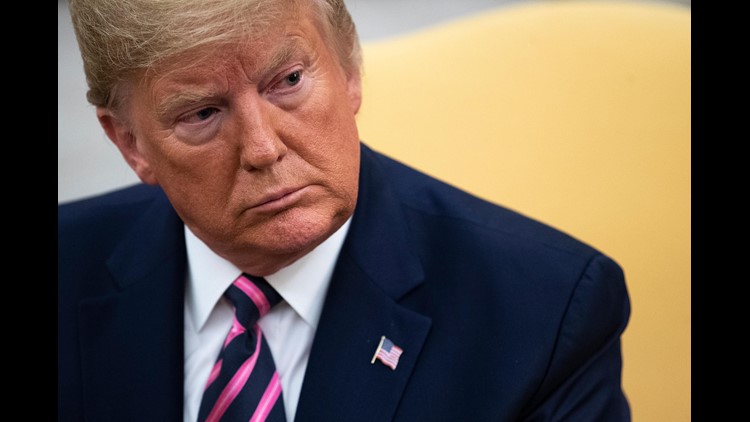(CNN) — The Trump administration on Thursday announced it is updating federal guidance for prayer in public schools and other initiatives aimed at protecting religious freedom, which administration officials said are aimed at reducing discrimination against people and groups of faith.
The changes, announced on National Religious Freedom Day, include proposing new rules from nine federal agencies on social services programs, updating federal guidance on prayer in public schools and instructing federal agencies to ensure states do not condition grants of federal funds “in a manner that would disadvantage grant applicants based on their religious character,” according to the White House.
“This afternoon we’re proudly announcing historic steps to protect the First Amendment right to pray in public schools. … There’s nothing more important than that, I would say,” President Donald Trump said Thursday alongside administration officials, religious representatives, students and teacher advocates.
The updated guidance will require state departments of education to provide a clear process for people to report complaints that individuals were denied constitutionally protected prayer. It also requires those departments to report public charges of religious discrimination, such as a lawsuit, to the US Department of Education, and adds a section describing religious expression and the Equal Access Act.
Trump claimed that “there’s a growing totalitarian impulse on the far left that seeks to punish, restrict and even prohibit religious expression.” He called the new guidance “the right to pray.”
He added, “While I’m President … we will not let anyone push God from the public square. We will uphold religious liberty for all.”
The Department of Education is proposing additional regulations and guidance, including a regulation laying out that “a public institution of higher education cannot deny a religious student group the same benefits, privileges and rights that other secular student groups have,” a senior administration official said.
With the updated guidance on prayer in public schools, the department will also be “fulfilling a statutory requirement to issue guidance on constitutionally protected prayer in public elementary and secondary schools” — guidance that’s required to be updated every two years, but hasn’t been updated since 2003. The guidance, the official said, will now spell out processes for reporting allegations of religious discrimination in schools to the department.
Dr. William Jeynes, a professor at California State University, Long Beach, consulted with the Department of Education on the new guidelines related to religious liberty in schools. He said that among his recommendations, he suggested terms like a “moment of silence” be used in lieu of “prayer” within some of the guidance, and relayed to the administration that faith plays a major role for some children.
“What I am especially concerned about is students who … my goodness, they don’t have much going for them in life. They have a lot of hurdles to overcome, whether it be a family situation, a neighborhood situation, racism, low socioeconomic status — I mean the list goes on — and there are quite a lot of … kids where God is about all they have. And we don’t want to discourage them,” Jeynes said. “We just want them to be able to use any source of strength that they have. So, personally, that is my greatest concern, that students shouldn’t have to be hassled if they want to pray over their meal or what have you.”
The newly announced changes are the latest in a line of efforts to further put faith front and center in the Trump administration.
During the last United Nations General Assembly, Trump announced new initiatives as part of a global call for protecting religious freedom. In 2018 the Department of Health and Human Services created a civil rights division meant to protect medical personnel who refused to treat certain patients because of their religious beliefs. Cabinet members established a weekly Bible study early in the administration.
The administration’s latest efforts were swiftly criticized Thursday by some nonprofit groups, including the Freedom From Religion Foundation and American Atheists.
Annie Laurie Gaylor, co-president of the Freedom From Religion Foundation, argued that “(t)he educational rules break no ground, and pretty accurately summarize the state of the law with regard to school prayer and religious instruction, similar to the guidelines previously issued about this by both Presidents (Bill) Clinton and (George W.) Bush.” The foundation also said the administration missed “the chance to adequately warn schools about common First Amendment violations.”
“Importantly, both the Bush guidance and the copycat document released today affirm a core constitutional protection: School officials are prohibited from imposing their faith on students,” said Daniel Mach, director of the American Civil Liberties Union Program on Freedom of Religion and Belief. “The question, as always, is whether public-school officials will heed this warning. If they don’t, we’ll be there, as always, to correct them — and if necessary, we’ll see them in court.”
The Rev. Johnnie Moore, a member of Trump’s informal evangelical advisory board, contended that the “White House isn’t saying whether one should pray or to whom or what they should pray to” with the announced changes but that “they are simply making it clear that in the United States students have First Amendment rights also, and our ‘separation of church and state’ wasn’t intended to suppress a vibrant religious life in America but to facilitate it.”



